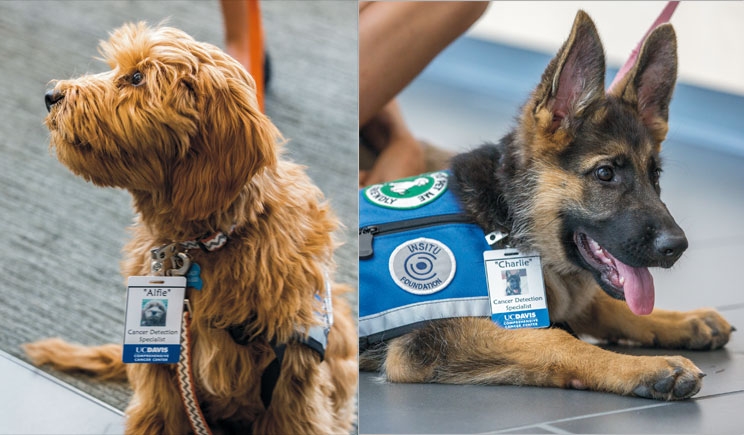
Someday, your new assistant may have 4 legs and wear a flea collar. Researchers at the University of California, Davis (UC Davis), are investigating how dogs and their powerful noses may be used to detect different cancers, including head and neck cancer.
Researchers have established that dogs can recognize melanoma as well as bladder, lung, breast, and ovarian cancers. Dogs also have been successfully trained to distinguish the breath samples of lung and breast cancer patients from those of healthy volunteers. These results suggest dogs could be used in safe, early, noninvasive cancer detection.
“Identifying patients at earlier stages could be extremely helpful in the fight against cancer,” said Gregory Farwell, professor of otolaryngology and director of the UC Davis head and neck oncology and microvascular surgery program.
Over the next 12 months, a labradoodle named Alfie and a German shepherd named Charlie will work with a university team of physicians, veterinarians, and animal behaviorists to learn how to identify the scent of cancer in samples of saliva, breath, and urine.
Dina Zaphiris, director of the In Situ Foundation in Chico, Calif, will train these 5-month-old canines. Ms. Zaphiris already has trained more than 2 dozen dogs in cancer detection. She says that almost any dog could be trained to detect cancer, though she prefers German shepherds, Labradors, poodles, and herding breeds because of their work ethic.
Dogs can detect odorant concentration levels at one to 2 parts per trillion, about 10,000 to 100,000 times that of a human being. Current cancer screening methods, though, often don’t catch the disease until it is past the so-called golden hour when treatment would be most effective.
“Despite all the advances of modern medicine, we still can’t reliably detect many types of cancers in their early stages,” said Peter Belafsky, professor of otolaryngology. “Our new canine colleagues represent a unique weapon in the fight against cancer.”
The dogs’ human-cancer screening work will begin in early 2016 with a clinical trial to establish the safety and efficacy of the new diagnostic canine approach. Researchers hope to understand the mechanism by which they can use their keen sense of smell to provide clues that may lead to technologies that could be used in clinics. The dogs themselves won’t be used in clinics.
“For the past number of years, we have been developing very high-end, expensive new tests to try and detect the presence of cancer,” said Ralph de Vere White, distinguished professor of urology and director of the UC Davis Comprehensive Cancer Center. “This work marries sophisticated technology with low-tech, yet sophisticated, dogs’ noses to see if they can help us identify the molecules that differentiate cancer from non-cancer.”
“Much like the handheld devices used to detect alcohol, drugs, and explosives have revolutionized our safety, having a new tool to detect early stage cancer would have incredible benefits for patient care,” said Hilary Brodie, professor and chair of the UC Davis department of otolaryngology.











